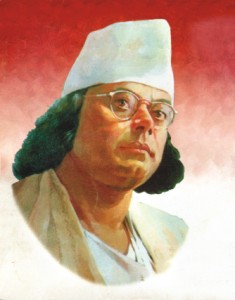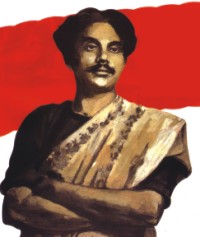|
Tribute
Nazrul -- his Stirring Passions, his Romantic Soul
Syed Badrul Ahsan

Source: www.theage.com.au |
Nazrul comes to you as a comet. But that is simply one of the many facets to his character. Think of him as a revolutionary, as the magician who wished the song durgom giri moru kantar to take shape. Or wonder at the sheer drawing power of chol chol chol. You are left amazed at the sheer surfeit of talent in the poet. And that makes you go despondent, in the knowledge that in the more than three decades he spent in limbo brought on by his illness in 1942, he could have attained heights greater than those he is recognised for today.
Nazrul's was not a life of privilege. Nor was it spent in seeking the sympathy of others to his plight. When you travel through the entire tortuous landscape of his life, you are struck by the degree of self-esteem he brought to himself, to his creativity. He would sit down among friends on a sultry afternoon and in minutes come up with a poem, which he then would briskly set to tune. That was his greatness. And hints of such greatness came through his service in the army. You do not expect a havildar to look forward to anything more than a slow, patient rise through the ranks. Nazrul went beyond that, coming away from Karachi to Calcutta, composing poetry and going to prison for it. There was conscience in the man, for he was an involved individual. Politics was a passion for him just as poetry came close to being the circulation of blood in his corporeality. In jail, he went through a forty-day period of hunger to protest the appalling conditions there. His contemporary Shailajananda appealed to him to break his fast. Rabindranath Tagore did his own bit to dissuade Nazrul from carrying on with his protest. And yet it was principles that underlined his act. He needed to prove a point. And he did.
Have we neglected Nazrul all these years? Quite a question, you might add. Yes, in this free republic of Bangladesh, we have proudly decided to robe him in the attire of a national poet. The more conservative, indeed politically motivated rightwing among us often are happy placing a skullcap on Nazrul's head, the better to project him as a fountainhead of Islamic belief. Nazrul would be the first one to protest such audacity, for a poet goes beyond frontiers, beyond the narrow confines of fanaticism. Worse has been this attempt to place Nazrul and Tagore on the same pedestal. That has been the height of philistinism, for the simple reason that you do not measure the weight or appeal of poets inasmuch as you do not measure the variety that comes with poetry on the same scale. You do not make celebrities of poets. And you do not do the edifying when you cease talking of Nazrul Geeti and replace it with Nazrul Sangeet --- because there is Rabindrasangeet before you. And yet that has been a method in the way we have systematically pushed Nazrul down the slope. He has deserved better.
And he does that because of all the romance he calls forth in his poetry. Of course, the inimitable Bidrohi is there. And there is too the lilting Amina maayer kole song. But pass on, to the mesmerisingly romantic mor priya hobe esho raani. It is the image of a beautiful woman, your beloved, rising from the mist, getting to be enfolded in the magic you weave around her. You begin with her hair and you do not stop till you place the alta on her feet. If ever you needed passion, this is it. And passion again comes enveloped in all the beauty of sadness. Listen to Laily tomar eshechhe phiriya or ke bideshi bon-o udashi and hear the throbbing beats of love welling up in you for the woman you may never have cause to spot entering your courtyard on tiptoe. And that is when you might break forth into amar aponar cheye apon je jon khunji tare aami aponaye.
That was Nazrul. He travelled freely through the Namib desert of the soul, leaving in his journey's wake an immensity of possibilities. In keno mono bone, it is romantic grandeur that slowly rises to the top. If you were now to dwell on mora aar jonome hongsho mithun chhilam, you would sense grandeur at its Olympian heights. In essence, Nazrul's poetry remains an all-encompassing affair. Always at the receiving end of criticism, forever condemned by the so-called purists of Islam, he demonstrated in little time his grasp of Muslim history and his comprehension of the Islamic heritage. That comes through in Allah-te jaar purno iman kotha shey Mussulman. It was right on target,  puncturing holes in the armour of the self-righteous. And, to be sure, his hold on the fundamentals of Hinduism come revealed equally well. All of this made him a secular man, for poetry cannot but be secular in spirit. Anything less would have it mutate into propaganda, or undiluted philistinism. Poems of the nature of kandari hushiar underscore this belief. puncturing holes in the armour of the self-righteous. And, to be sure, his hold on the fundamentals of Hinduism come revealed equally well. All of this made him a secular man, for poetry cannot but be secular in spirit. Anything less would have it mutate into propaganda, or undiluted philistinism. Poems of the nature of kandari hushiar underscore this belief.
Nazrul inhabited stirring times. He knew Gandhi and sang in the presence of Nehru. His radicalism matched that of Subhas Chandra Bose. And Deshbandhu C.R. Das knew him well. Sharatchandra met him in jail and Acharya Prafulla Chandra heard him with rapt attention.
The times yet stirred, a new era marched to the beat of his melody, when a free Bangladesh brought him home to a land that had always been his --- on 24 May 1972. It was his seventy third birthday. Firoza Begum sang before him, trying to shake somewhat his memories out of the atrophy they had declined into. Bangabandhu Sheikh Mujibur Rahman paid Nazrul his respects in the evening. 'The rebel meets the rebel,' so proclaimed a newspaper the next day.
It is Nazrul's spirit of rebellion, his willingness to bore holes into entrenched decadence, that continue to underscore the lives of millions of Bangalis, in this country and around the world. Chiro unnoto momo shir --- the head forever held high, in justified hubris and necessary courage --- is a stream of thought coursing through generational barriers.
In the depths of the night, it is Nazrul's spirit you recall. Through the sounds of the monsoon rain, you hear shaon-o rate jodi shorone aashe mor-e / bahir-e jhorh bohe noyon-e baari jhor-e.
.Copyright
(R) thedailystar.net 2008 |
|
